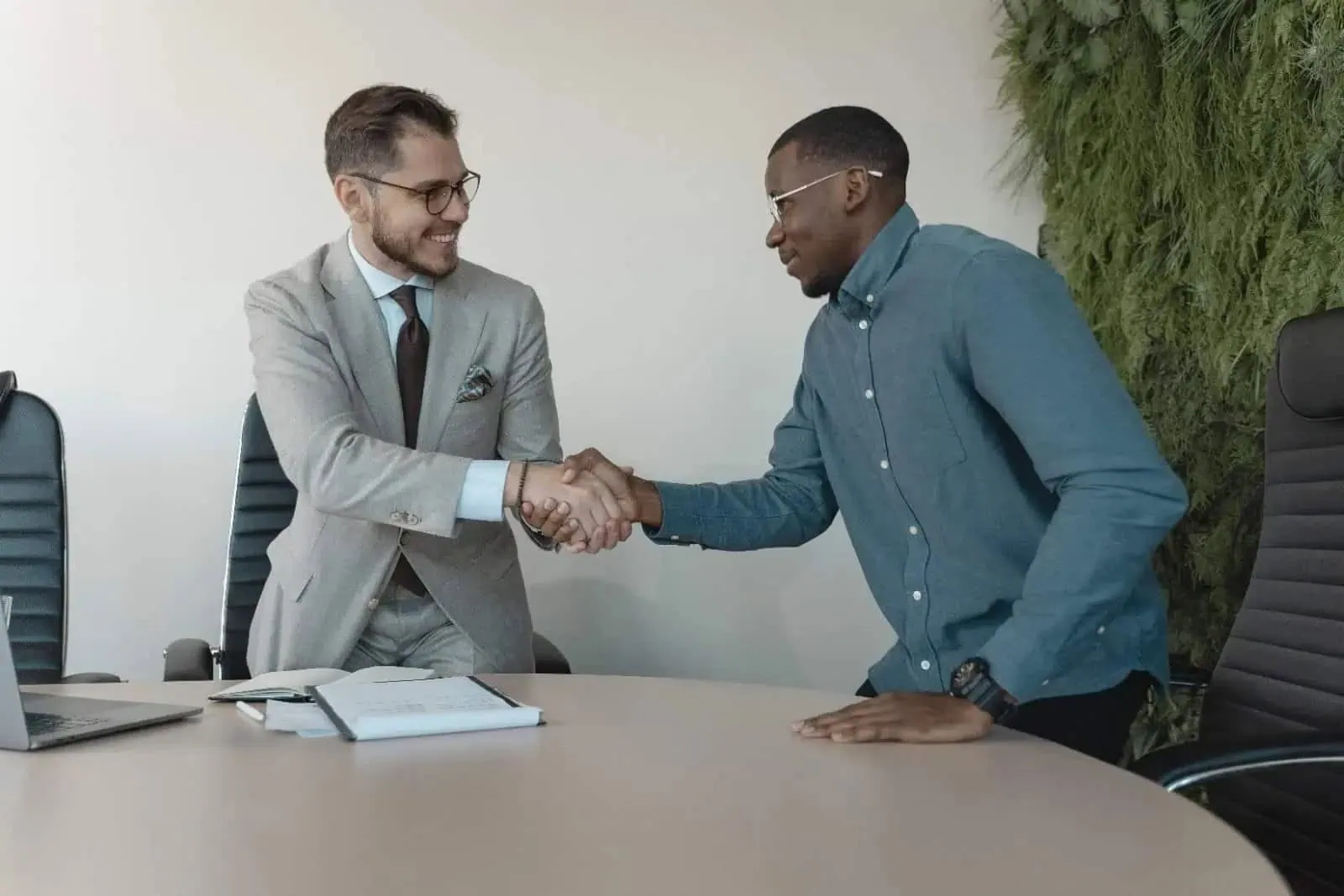Welcome to the ultimate guide on job interview techniques! If you’re an entry-level job seeker, you’re probably eager to make a great first impression and land your dream job. Interviews can be daunting, but you can stand out as a strong candidate with the right preparation and mindset. This guide is here to walk you through the essential steps of interview preparation—from researching the company to following up after your meeting.
Throughout this guide, you’ll learn valuable strategies and tips to tackle common interview challenges. Whether you’re wondering how to answer tough questions, what to wear, or how to express your enthusiasm, we’ve got you covered. By the end, you’ll comprehensively understand job interview techniques that will boost your confidence and readiness.
The goal of an interview is to secure a job offer and find a role and a company where you can thrive. So, let’s embark on this journey together. Equip yourself with these job interview techniques, and take one step closer to starting your career on the right foot.
Understanding Job Interview Techniques
Knowing the right job interview techniques can be a game-changer when you’re hunting for a job. It’s not just about answering questions. It’s about showing who you are and how you fit. Let’s dive into how understanding these techniques can set you up for success.
Why They Matter
Good interview techniques can make you stand out in a crowded field. They show your preparation, confidence, and fit with the company’s culture. Plus, they give you a chance to highlight your strengths in a way that your resume cannot.
Preparation Is Key
Preparation is at the heart of effective job interview techniques. This means more than just scouting the company’s website. Dive into their mission, recent achievements, and the industry they’re in. Understanding industry trends and challenges is crucial for those aiming for roles in specific sectors, like biotech jobs. Also, consider visiting educational resources like the Bureau of Labor Statistics for industry insights.
Practicing Makes Perfect
Another cornerstone of good job interview techniques is practice. Prepare your answers to common questions, but also think about what unique insights you can provide. This will not only make you more confident but also more memorable.
Interviews are a two-way street. They’re as much about you finding the right fit, as the company finding the right candidate. So, understanding and applying solid job interview techniques is crucial to both parties’ success.
Doing Your Homework: Company Research Interview
One of the top interview preparation tips is to research the company thoroughly. This step is vital to impress and see if the company’s goals align with yours. Here’s how to approach it:
Understanding the Mission
Start with the company’s mission statement. It tells you what drives them. You can often find this on their website’s “About Us” page.
Product and Services Insight
Know what the company offers. This helps you discuss how your skills can support their products or services.
Keeping Up with News
Look for recent news about the company. Achievements or changes show where they’re heading. This can spark great discussion during your interview.
Figuring Out the Culture
Company culture affects daily life greatly. Check their social media and blog posts to understand their values and work environment. Also, sites like Glassdoor can provide insights from current and past employees.
Understand Their Competitors
Knowing the company’s main competitors helps you understand the larger industry landscape. This knowledge can make your answers more insightful.
If done right, company research for your interview does more than prepare you for questions. It shows your interest in the role and your proactive attitude. Plus, it helps you decide about your potential new job home.
Ace Common Questions: Interview Questions Practice
Practicing answers to common interview questions is a vital part of job interview techniques. This preparation helps you articulate your thoughts clearly and confidently. Let’s break down how to practice effectively.
Start with the Basics
Every interviewer asks a few standard questions. Start by preparing for these:
- “Tell me about yourself.”
- “Why do you want this job?”
- “What are your strengths and weaknesses?”
Use Real Experiences
For each question, consider real examples from your work or volunteer experiences. This makes your answers authentic and engaging.
Practice Out Loud
Saying your answers out loud is the best way to practice. Try it in front of a mirror or record yourself for an added benefit.
Seek Feedback
Getting feedback is crucial. Ask friends or family to listen to your answers. They can provide valuable insights on areas to improve.
Stay Flexible
Be prepared to adapt. Interviews can go in many directions. So, while it’s good to practice, also be ready to think on your feet.
With solid interview questions practice, you’ll feel more at ease during the actual job interview. This confidence can make all the difference.
Dress to Impress
Dressing appropriately is a key job interview technique. It can influence the first impression you make. Here’s how to pick the right outfit:
Research the Company’s Culture
Start by understanding the company’s dress code. If it’s a formal business, opt for a suit. For a more casual place, business casual is usually safe.
When in Doubt, Go Slightly Formal
If you’re unsure, it’s better to be slightly overdressed than underdressed. A neat, conservative look works best in such cases.
Keep It Simple
Avoid flashy colors and excessive accessories. Choose something that reflects professionalism and attention to detail.
Comfort Matters
You should feel comfortable and confident in what you wear. This confidence will show in the interview.
Final Touches
Ensure your clothes are clean, pressed, and fit well. Pay attention to your grooming as well.
Remember, how you dress for your interview can significantly affect the interviewer’s perception. You’re one step closer to making a positive impact by choosing the right outfit. For more info on professional attire, visit the U.S. Department of Education for guidelines on workplace expectations.
Questions You Should Ask
Asking the interviewer questions is an essential part of job interview techniques. It shows your interest in and research into the company. Plus, it helps determine if the role is right for you. Here’s what to ask:
About the Role
Start with questions about the job. Ask about daily tasks, team size, and how success is measured. This shows your eagerness to contribute.
Company Culture
Understanding the company culture is vital. Inquire about team dynamics, company values, and what makes the workplace unique.
Future Prospects
Questions about growth opportunities show you’re thinking long-term. Ask about career paths, learning opportunities, and the company’s future plans.
The Team
Getting insight into the team can reveal a lot about the work environment. Ask about team strengths, challenges, and recent achievements.
Next Steps
Ending with this question shows initiative. Ask about the next steps in the hiring process and timelines. This helps you plan your follow-up accordingly.
Preparing your own questions can set you apart in the job interview. For more ideas on what to ask, check resources like CareerOneStop provided by the U.S. Department of Labor.
Using the STAR Method Right
The STAR method is a powerful technique in job interviews to answer behavioral questions effectively. It stands for Situation, Task, Action, and Result. Here’s how to use it right:
Outline the Situation
Start by setting the scene. Describe a relevant situation or challenge you faced. Keep it concise and relevant to the question.
Explain the Task
Detail the specific task you were responsible for in that situation. This clarifies your role and the expectations.
Describe Your Action
Focus on what you did to address the situation. Highlight the steps you took and why they were important.
Share the Result
Conclude with the outcome. Emphasize the positive impact of your actions, using numbers, if possible, to quantify your success.
Applying the STAR method helps you deliver structured, impactful answers during job interviews. It demonstrates your problem-solving skills and ability to achieve results. For more examples of the STAR method in action, browse success stories on the Association for Computing Machinery for tech-related achievements.
Show Your Passion
One of the most effective job interview techniques is to let your enthusiasm for the role and the company shine through. Passion can be a decisive factor that sets you apart. Here’s how to show it:
Express Your Interest Clearly
Tell them why you’re excited about the job. Focus on specific aspects like the company’s mission or the role’s challenges.
Share Your Research
Mention interesting facts you’ve discovered about the company. This shows dedication and a proactive attitude.
Discuss Relevant Experiences
Share stories that highlight your interest and commitment to the field. Relate these experiences back to how they prepare you for this role.
Be Genuine
Your enthusiasm should feel authentic, not rehearsed. Let your genuine interest in the opportunity guide the conversation.
Showcasing your passion during the job interview can make a memorable impression on the interviewer. It demonstrates that you’re not just looking for any job, but this job at their company.
The Importance of a Follow-Up Interview
Following up after an interview is a crucial step in job interview techniques. It shows your sincerity and interest. Here are tips on doing it right:
Send a Thank-You Note
Soon after the interview, send a note to thank the interviewer. Mention something specific discussed to make it personal.
Keep It Professional
Your message should be concise and professional. Reaffirm your interest in the position and the company.
Use Email Wisely
Email is usually the best way to follow up. It’s quick and allows the interviewer to respond at their convenience.
Be Patient
After sending your thank-you note, give them time to respond. It shows respect for their process.
Prepare for the Next Steps
If they mentioned a follow-up during the interview, be ready. This shows you pay attention and are proactive.
Following up properly can strengthen your position as a candidate. It’s an important part of job interview techniques that shouldn’t be overlooked.
FAQs
How early should I arrive for an interview?
Arriving 10-15 minutes early is ideal. It shows punctuality without being too early.
What should I bring to the interview?
Bring multiple copies of your resume, a list of references, a notebook, and a pen. It’s better to be over-prepared.
How do I handle a question I don’t know the answer to?
Be honest if you don’t know an answer. You can say you will research it further. This shows integrity and a willingness to learn.
Can I negotiate my salary during the first interview?
It’s usually best to wait until a job offer is made before discussing salary. Early negotiations might seem presumptuous.
What should I do if I’m running late for an interview?
Contact the interviewer as soon as possible to let them know. I apologize and ask if it’s still possible to meet or reschedule.
Remember, interviews are opportunities to learn and grow. Every interview experience is a step towards your next role.
Conclusion
Mastering job interview techniques is key to landing your dream job. From exploring job search websites and researching the company to sending a follow-up, every step matters. Remember to practice answering common questions and showing enthusiasm for the role. And don’t forget the importance of asking insightful questions and dressing for success. Interviews are your chance to shine and demonstrate why you are the best fit for the position.
But the journey doesn’t stop at the interview. Joining a community that supports your career aspirations is crucial. Join Diversity Employment to connect with a network of inclusive companies and access resources to help you succeed in your career. Whether you’re seeking support, new opportunities, or industry insights.
Take the next step toward your career goals. Embrace every opportunity to learn, grow, and showcase your talents. Your dream job is within reach—equip yourself with the right job interview techniques and join a community that champions diversity and inclusion.




